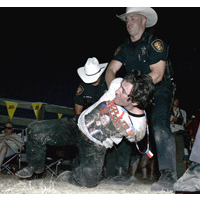Miami Police Accused of Using “Excited Delirium” to Cover Deaths in Custody

Nearly 30 people have died in the custody of the Miami Police Department over the past decade from a rare neurological disorder, prompting critics to accuse officials of covering up the true cause of the fatalities.
Officially, 29 deaths have been attributed by the Miami-Dade Medical Examiner’s Office to “excited delirium syndrome,” an uncommon brain malfunction not recognized by the American Medical Association.
Although the syndrome dates back to the 1840s, it was first officially documented in a published research paper during the South Florida cocaine epidemic of the 1980s. It is often fueled by cocaine or mental illness, and can result in violent, physical rages.
Of the 29 deaths linked to the syndrome, most have involved police action, including officers using physical restraint or stun guns on the victims.
The American Civil Liberties Union (ACLU) and relatives of the dead have questioned the autopsy findings, contending that the syndrome is being used to shield overaggressive police tactics.
“The data supporting it is tenuous. I think excited delirium is often used as a catch-all to explain in-custody deaths,” Indiana University cardiologist Dr. Douglas Zipes, who testifies on behalf of clients suing Taser International, told the Miami Herald.
Supporters counter that the syndrome is real, noting its acceptance by the National Association of Medical Examiners and the American College of Emergency Physicians.
San Francisco cardiac pathologist Dr. Steven Karch, who has studied the syndrome, told the Herald that police are often involved due to the violent outbursts of the sufferers. Although he denied that Tasers are usually a factor in those outbursts, more than a third of the 29 syndrome-cited people who died at the Miami Police Department had been shot by Tasers.
The ACLU’s Eric Balaban firmly believes the syndrome is being used by police “as a means of white-washing what may be excessive use of force and inappropriate use of control techniques by officers during an arrest,” he told National Public Radio (NPR).
Medical professionals interviewed by NPR said that people exhibiting the syndrome through an outburst have been tranquilized in a hospital setting and wake up fine. But “police officers are not allowed to administer medicine,” said NPR’s Laura Sullivan. “They have only their nightsticks, Tasers, pepper spray or their own bodies—which may make the situation worse.”
In 2009, a task force of the American College of Emergency Physicians estimated that at least 250 people die from the syndrome every year.
-Noel Brinkerhoff, Danny Biederman
To Learn More:
Controversial, Troubling Trend: Death by ‘Excited Delirium’ (by David Ovalle, Miami Herald)
Death by Excited Delirium: Diagnosis or Coverup? (by Laura Sullivan, National Public Radio)
Justice Dept. begins Unprecedented Monitoring of Miami Police over Fatal Shootings (by Noel Brinkerhoff, AllGov)
- Top Stories
- Unusual News
- Where is the Money Going?
- Controversies
- U.S. and the World
- Appointments and Resignations
- Latest News
- Trump to Stop Deportations If…
- Trump Denounces World Series
- What If China Invaded the United States?
- Donald Trump Has a Mental Health Problem and It Has a Name
- Trump Goes on Renaming Frenzy






Comments